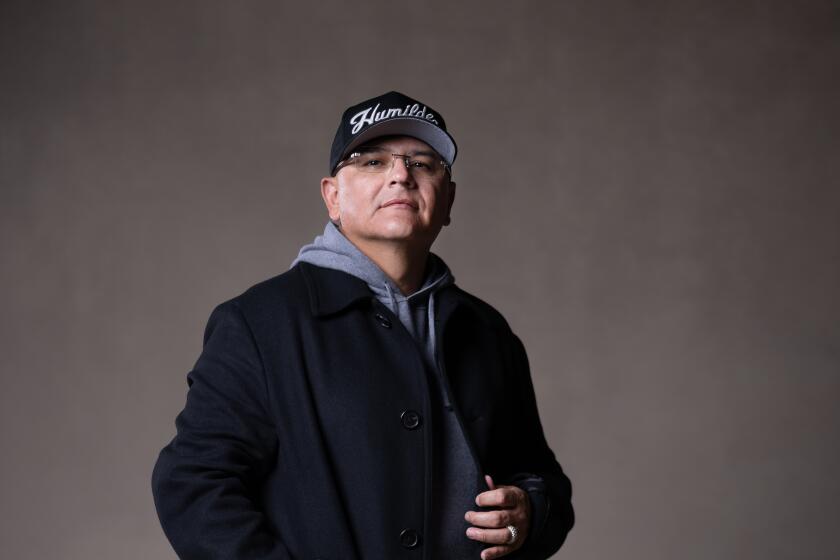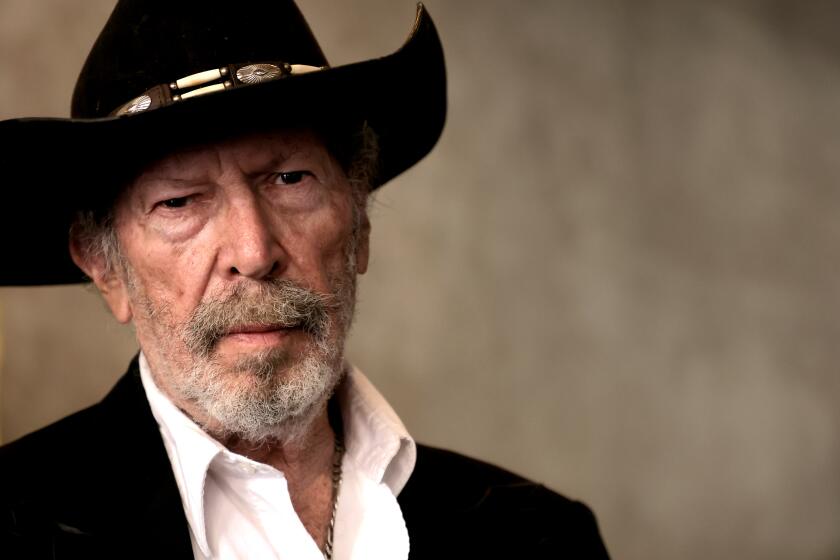THE KMET-FM STORY: REFLECTIONS ON A FALLEN FORMAT : ‘Whole Thing Had to Go,’ Says Program Director Frank Cody
It wasn’t just the bad ratings that killed KMET-FM (94.7), the long-lived and long-loved L.A. album-rock station.
It was an experiment involving a catsup bottle.
According to KMET program director Frank Cody, who fired the station’s entire on-air staff Friday as the first step in a complete overhaul of the failing rock giant, management had spent months researching ways to revitalize the station.
While Cody was telling the press last month that KMET needed to “move in a new direction, away from formula radio,” he was quietly working with a New Jersey-based consumer-product think tank, examining which direction the station should head.
“We made every attempt possible to save KMET,” Cody said in his first public remarks on the station’s sudden demise. “You just don’t give up such recognizable call letters that easily.
“We kept wondering, ‘Do we really have to change the call letters?’ Finally, I pulled out a bottle of Heinz catsup which I’d emptied the night before and refilled with a bottle of French’s mustard.
“Everyone looked at the bottle of catsup with the mustard in it and realized that listeners just wouldn’t accept the same station with completely new music. The whole thing had to go.”
Cody confirmed that the station’s owner, Metropolitan Broadcasting, has filed with the Federal Communications Commission to change the station’s call letters from KMET to KTWV-FM.
Cody declined to comment on the station’s new format, which is scheduled to debut Saturday at noon. (Until then, the station is playing “canned rock,” without deejays.)
Radio insiders have speculated that the new station will adopt a Top-40 style, new-music format, which would be a combination of KPWR-FM’s (105.9) dance-hits formula and KROQ-FM’s (106.7) new-wave music programming.
Cody refused to divulge the identity of the station’s new on-air staff, though he said KTWV will be manned by “recognizable” on-air personalities.
He insisted that listeners will have to find out the details for themselves, saying that “we want to keep it a surprise. It’s just like a new film. Unless you’re viewing a private screening, you have to wait for the curtain to rise.”
Cody said that, contrary to one published report, all the station’s sales staff has been retained.
KMET’s sudden death, which marks the end of an era in L.A. rock radio, prompted a wave of public mourning from local pop fans. Rival album-rock station KLOS-FM (95.5), which stands to gain the most new listeners from the shake-up, has been particularly vocal, while other local outlets have also offered public condolences.
While declining to give specifics about the station’s new direction, Cody did detail the circumstances surrounding KMET’s demise. The station, plagued by poor ratings, had “been on a life-support system for some time now,” he said. (In the latest Arbitron ratings, covering last fall, KMET had dipped to No. 20 in the local market, its lowest rating ever, attracting a mere 1.6% of the radio audience.)
“We do weekly research, and it was clear from the information coming back that the station’s image was very tarnished,” he said. “The big successes here, as in every market, have been new-music stations. When the best that album-rock radio can do in this market is repackage its old hits in a ‘classic-rock’ format, then album rock is history.
“There’s no doubt that without KMET paving the way, we could never have pulled off this new format. But everything has a life cycle. The Beatles broke up. ‘The Mary Tyler Moore Show’ went off the air. And KMET had a great run, but the phenomenon is over.”
Cody joined KMET as program director last September, leaving NBC, where he had run the Source Network and the Entertainment Network. Just months after he arrived, he added a Sunday night new-music show, hosted by Deirdre O’Donoghue. Three weeks ago, he had rehired veteran KMET deejay Jim Ladd, who had been at KLOS.
(Both O’Donoghue and Ladd were fired Friday, along with such longtime deejays as Cynthia Fox, Pat (Paraquat) Kelly, Jack Snyder and David Perry.)
Meanwhile, Cody said, the station also initiated what he called a “KMET revitalization project,” hiring Owen Leach Research, a research firm that helps design and package consumer products.
“We examined a great number of radio success stories,” Cody said. “The idea was to try to retool the factory so you could turn out a product the public really wants.”
He added that the research group created “a great number” of possible programming concepts, which were tested locally during the past six weeks.
But why did KMET, with great fanfare, hire Jim Ladd a few weeks ago if a format change was inevitable?
“We really didn’t make the final decision to change everything until (Feb. 2),” Cody claimed. “It was ‘all systems go’ until the final decision. If our research had not been fully confirmed, we would’ve continued to refine what we already had.”
According to station deejays, they were notified they were fired during individual meetings at the Sheraton Premiere Hotel on Friday. They charged that Cody refused to allow them to return to the station to clean out their offices.
“I was told that I’d have to make an appointment to go back on Saturday,” Ladd explained. “And what I said was, ‘If this is it, I’m going down to the station now.’ Finally, they called the station and cleared the way for me to go in there.”
Cody countered: “It simply isn’t true that we didn’t allow anyone to go back (to the station). We merely said that we’d prefer that they not go back right away, because it would be hard on everyone who was still there.”
Still, deejays were upset by the way the dismissals were handled. “It was just the sleaziest thing I’d ever seen,” said morning deejay Rick Scarry, a 22-year radio veteran.
“I’ve been fired by the best. But I’d rather have someone say, ‘Get out of here’ than to walk into a room . . . and have (KMET general manager) Howard Bloom say, ‘The cancer was too deep. We just had to cut it out.’ ”
Cody insisted that the station handled the firings in a “tasteful” manner.
“The company had made a painful business decision. And we felt that by handling it outside the building, it could be best done with dignity and fairness,” he said.
“I’m sure there’s some anger. No one is happy about losing their job. But we all agonized over this. It was not a fun day for me.”
More to Read
The biggest entertainment stories
Get our big stories about Hollywood, film, television, music, arts, culture and more right in your inbox as soon as they publish.
You may occasionally receive promotional content from the Los Angeles Times.






